Most people can tell you what automotive mechatronics technicians – or more prosaically: car mechanics – or the service staff in a restaurant do. But many professions that play an essential role in research and even our everyday lives are more difficult to define for outsiders.
Fraunhofer IZM in Berlin Wedding trains people in two of these professions – microtechnologists and electroplater specialists. There is one thing the Institute is looking for in its candidates: a hands-on approach. This is because Fraunhofer IZM’s work is application-oriented – in actual research, but also in the dual apprenticeship system itself.
RealIZM has met Stefan Ast, head of training at Fraunhofer IZM, and Tobias Herrmann, second-year electroplater specialist apprentice, to speak about the advantages of the training and how the structure of the research institute helps make the training period exciting, varied, and challenging.
Hidden technology: How microtechnologists and electroplater specialists shape our everyday lives
Microtechnologists and their work are now more present than ever in our everyday lives. That’s because they make the microchips and sensors that are built into many of the products we use on a daily basis. But there is more to it. For professionals working in the field, developing new chips is as much a part of their everyday working life as actually producing them. Applied research is a big part of the training.
© Fraunhofer IZM | Testing set chips on a substrate /
© Fraunhofer IZM | Wafer processing in the clean room
Microtechnologists deal with the basic materials, such as wafers and substrates, and process them to create new features and functions. Various structuring processes are used to do so: coating, varnishing, photolithography, etching, or subsequent doping. More technical work steps such as preparing process sequences, planning test series, or setting up and monitoring production facilities are also part of the everyday work of microtechnologists.
The trainees from the 2022/23 training year show what these work processes look like in practice in a video they produced themselves.
© Fraunhofer IZM | Training at the Institute 2023
“Microtechnologist and electroplater specialists are both recognized apprenticeships that lead to a Chamber of Industry and Commerce qualification. Under expert guidance, the trainees quickly learn to work independently and effectively. This is important for research, but also when working on machines”, Stefan Ast explains.
After all, what is taught in the microtechnologist training may revolve around microscopically tiny components, but it has major implications.
The apprenticeships at Fraunhofer IZM focus primarily on aspects of microsystems technology – an area of specialization in the field of microtechnology. Central to it are teaching, research, and the development of microsystems – the integration of micromechanical and microoptical components into complex systems – as well as microprocessing technologies. These involve the investigation of physical or chemical processes, an area that electroplater specialists also deal with in their everyday work.
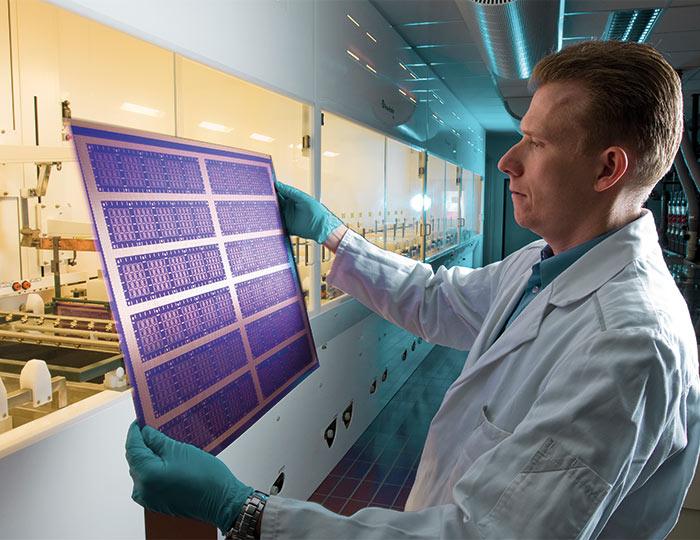
© Fraunhofer IZM | Re-inspection of a printed circuit board in surface coating
The work of electroplater specialists, similar to that of microtechnologists, may also not be visible to people at first glance, and yet it can be found all around us. They use various processes and techniques to coat surfaces made of a wide variety of materials – copper or steel, for example – in order to improve their electrical or optical properties. This can be a small screw, a circuit board, or an entire chassis. In the end, this coating protects against corrosion and wear. This is important because the work of electroplater specialists is used, among other things, in aerospace technology, where it has to withstand many different external forces.
Hands on experience: Research that encourages participation
“One special feature of the training is that everyone is fully involved right from the start, in a wide variety of departments”, says Stefan Ast. As in research, interdisciplinarity is also practiced in training. Openness to new things plays a major role. “That is why it is good that you’re not left alone during your training. Trainers and colleagues are there to provide concrete assistance when you need it.”
“It’s not unusual for young people to reach a point during their stay at a university or college when they realize that their studies are too theoretical for them. In our field, the training is also theoretical to some extent, but with a great deal of practical relevance. What you learn is applied immediately and doesn’t end up in a folder for years. That helps a lot of people, and they find that what they didn’t like at the beginning – math, physics, chemistry – is something for them after all. Especially because they’re encouraged to think and help out.”
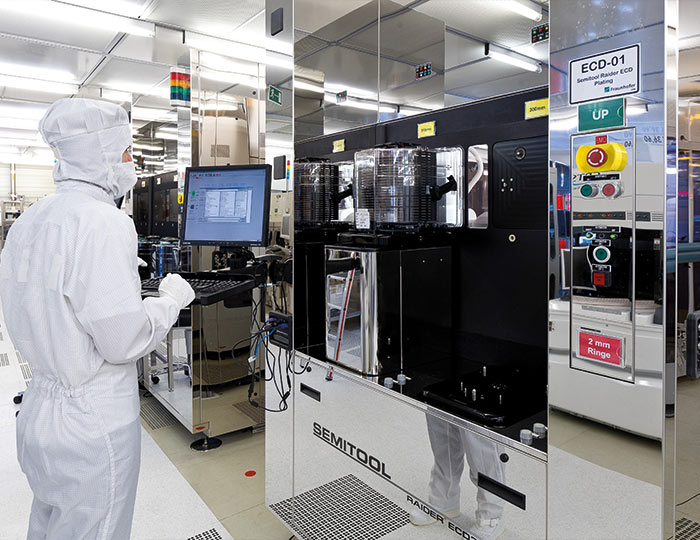
© Fraunhofer IZM | Complex machines must be controlled and monitored
Tobias Herrmann, who has been training as an electroplater specialist at the Institute for the last two years, can confirm this: “There are datasheets for many test series. Or the internet, where it is described exactly which chemicals have to be mixed in which ratio for which coating. But for many, there aren’t. Then we have to mix something ourselves. Thinking for ourselves, fiddling around. That’s not possible at many other companies. But at our institute, it is.”
The trainees go through about a dozen work groups in different departments – in order to learn all the required specialist topics of their job description in practice – and get to know a large part of the almost 70 laboratories and three cleanrooms of the research institute.
This is an experience that young girls can also gain during the annual Girls’ Day. For more than two decades, Fraunhofer IZM has been part of this nationwide day of action as well as EnterTechnik, the technical year for young women, during which participants gain an insight into technical professions from the STEM and skilled trades sectors. This is because the goal is to steadily increase the proportion of women in these occupations, which stood at only 16% in 2022.
© Fraunhofer IZM | Schoolgirls at Girls’Day 2023 at Fraunhofer IZM Berlin
Another aspect contributing to this project is Fraunhofer IZM’s cooperation with Berlin’s Gabriele von Bülow Gymnasium, which started in 2018. The partnership helps establish more points of contact between young women and technical professions, for example in the form of student internships. The insights gained in the process paint a more accurate picture of exciting career paths and can help people make up their minds when it comes to career orientation.
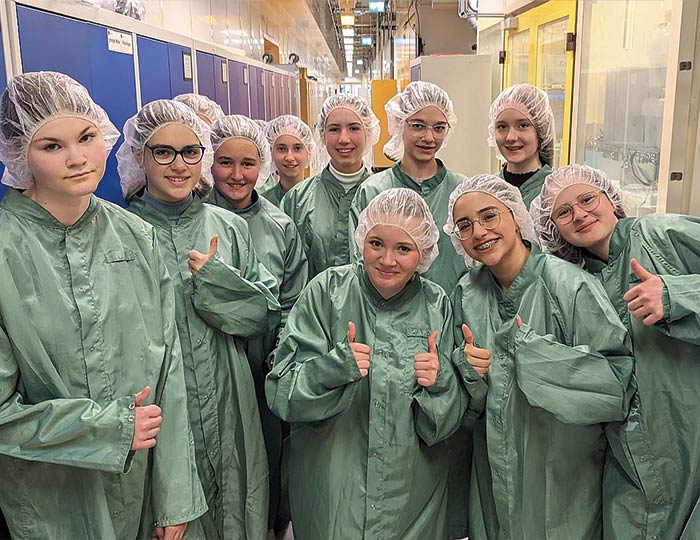
© Fraunhofer IZM | Introduction to the cleanroom at Girls’Day 2023 at Fraunhofer IZM Berlin
Perfect preparation for employability and a great future
Another important reason that makes training at Fraunhofer IZM so special is the potential offered by the job profiles. According to the BMWK, it is primarily the skilled trades, the metal and electrical industries, and the MINT sector that are looking for skilled workers. The apprenticeships at Fraunhofer IZM are part of this and offer security and lots of opportunities to develop further in one’s career.
“If you complete your training with good results, you don’t need to worry about your future,” confirms Stefan Ast, and then adds, “Moreover, there are ways to develop further. You can later build up to a degree as a technician, or you can decide to go to university. I also took this path. After my apprenticeship as a toolmaker, I started studying. And now, 20 years later, as a training manager, I see how much practical experience helps the trainees. During my time at the Institute, I’ve accompanied 50 of them on their way to a vocational qualification, and what they took away from the three-year training period at Fraunhofer IZM was a great help to all of them when making decisions later on.”
THE FRAUNHOFER IZM TRAINs MICROTECHNOLOGIST AND OFFICE MANAGEMENT ASSISTANTS STARTING IN THE FALL OF 2024. APPLICATIONS FOR THE TRAINING YEAR 2024 Are STILL open UNTIL JANUARY 31, 2024, VIA THE CAREER PORTAL OF THE FRAUNHOFER IZM!
Tobias Herrmann can again confirm this: “The training has helped me in many ways. Being so involved with chemicals at Fraunhofer IZM has given me a lot of knowledge that can be applied in numerous other areas. And who knows, maybe one of my contributions at the Institute will lead to a new standard being set in research. And that would actually be pretty cool.”

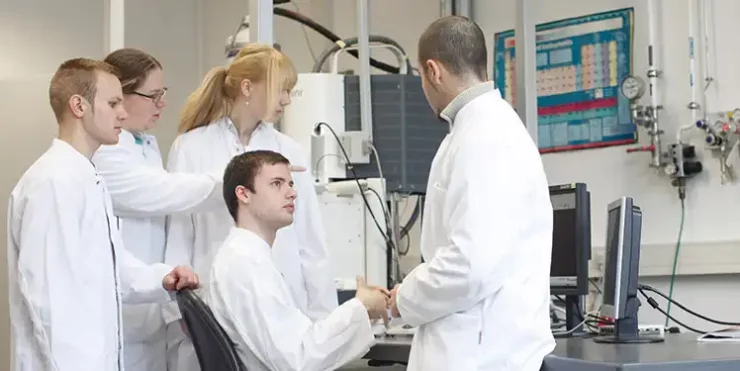
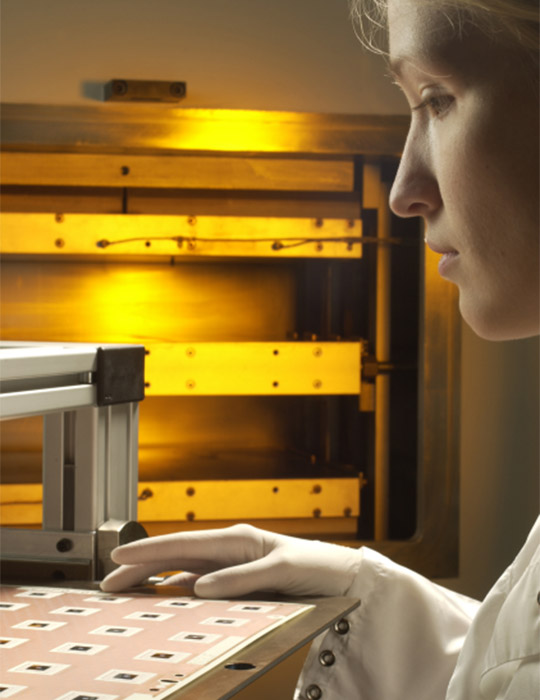
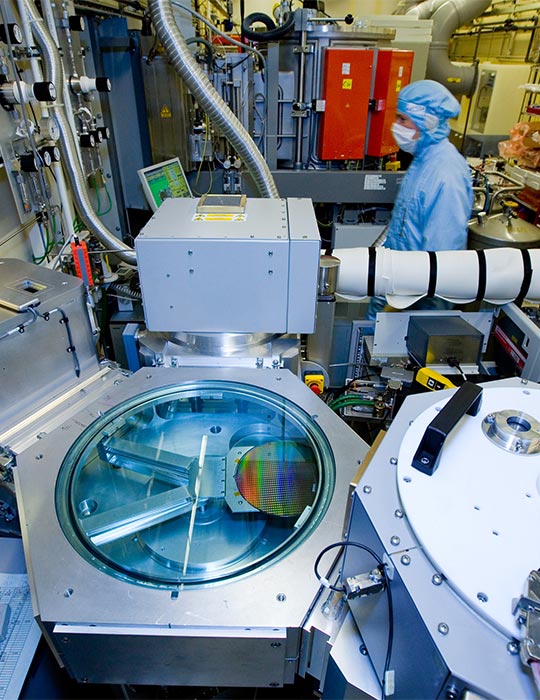
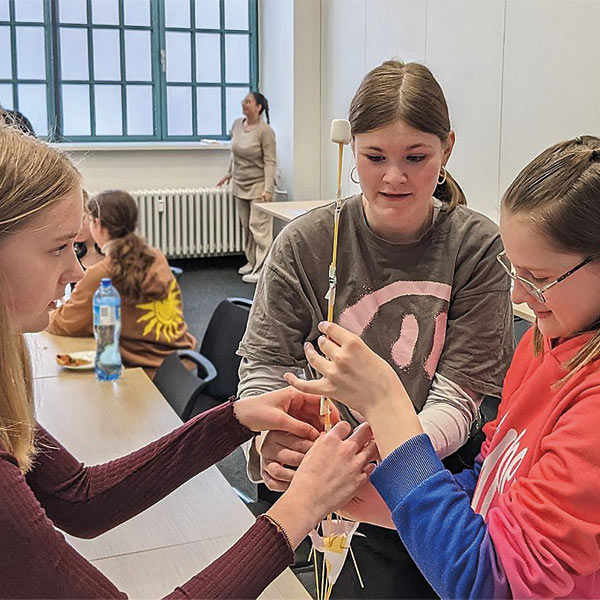
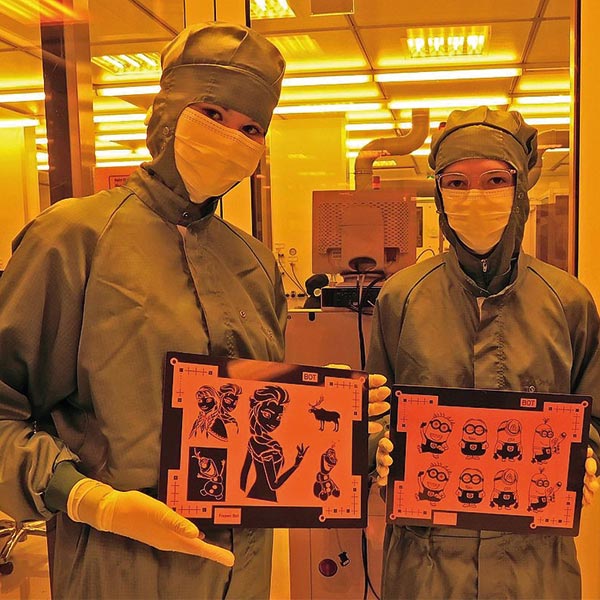
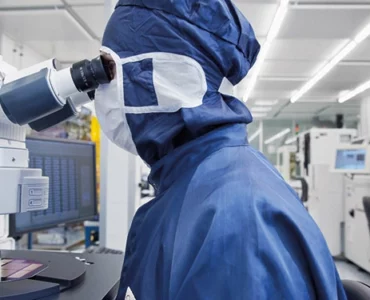


Add comment